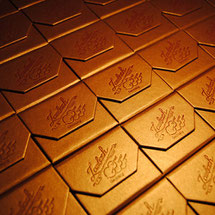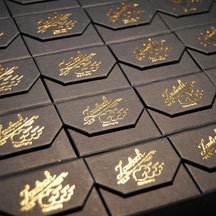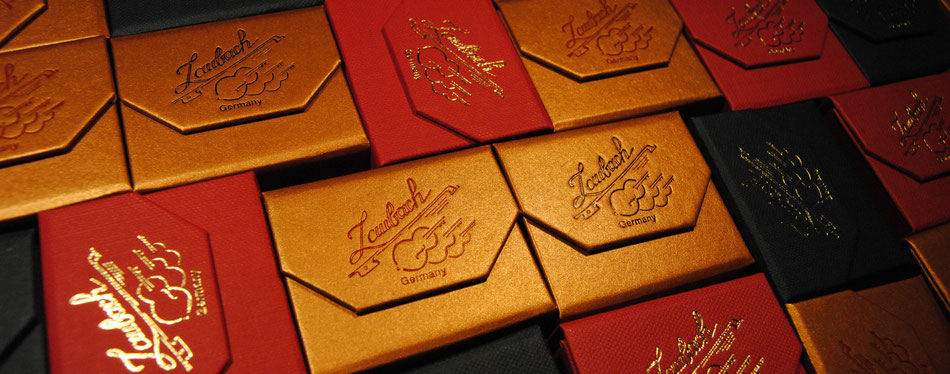Rosin for Violin viola & cello
Laubach Rosin - directly from the family workshop.
Our Gold Rosin premium class is made in small quantities in the family workshop in Bavaria, Germany.
For the production of exclusive rosin which is being cast entirely by hand, we only use the highest quality natural ingredients.
It is very important for us, that our rosin meets the high demands of professional musicians.
Rosin is undoubtedly an essential accessory to all violin, viola and cello players. Without a doubt, Laubach is the best known brand in rosins. Used by professionals and amateurs worldwide, this is the rosin that other brands strive to emulate.
The Laubach Brand rosins are wrapped in cardboard box with a magnetic lid shell for easy storage and protection.
In our experience (and many others):
* The light Gold rosin is slightly harder than the dark and is known for its 'moderate' powder.
* The dark rosin is slightly softer and grips a bit better than the lighter variety.
Production and Origin of rosin:
Rosin is made from balsamic natural resin, usually of the tree species pine, fir, pine, larch and spruce.
The name "rosin" is from the ancient Greek city Colophon.
Differences and qualities of rosin:
Rosin is produced in different grades. Usually a dark rosin is slightly harder than a light rosin and preferable at higher room temperatures.
Steel strings require a lower
Synthetic strings have an average
Gut strings a higher bond strength
Violin bow needs the lowest bond strength (hardest rosin)
Viola bow requires a lower bond strength (hard rosin)
Cello bow, bass viol bow an average adhesion force (medium soft rosin)
Double bass bow a high adhesive force (soft rosin)
Usage of violin rosin:
It is used to treat the horse hair of a bow string so that string vibrations are thus produced when painting over the strings.
For this, the rosin is distributed evenly over the hair of the bow.
At very cheap (and often tacky) Rosin, the dose should be economical to noise and to reduce heavy pollution of the bow, the strings and the instrument.
About Rosin
The first stringed instruments were, as might be expected, crude affairs, plucked or hit with sticks formed mostly from dried sheep gut.
It was later discovered that horsehair could be drawn across the string producing a long continuous note that is the basis of much of the music we know today. However to be effective some medium was required to achieve the friction necessary to push the strings into vibration.
The ideal medium proved to be rosin.
Rosin is the purified form of the natural resin secreted by fir and pine trees. This is then heated and mixed with oil and other ingredients according to carefully guarded recipes. The mixture is then cooled and allowed to solidify in the now familiar cake form.
These recipes vary considerably and are carefully formulated to suit different types of strings and playing styles.
Violin and viola rosins are generally drier and harder than for other instruments. Harder rosins are particularly effective on metal strings, whilst medium rosins perform well on synthetic strings. For gut strings a softer, stickier rosin is recommended. Cello rosins are usually medium, and those for double-bass softer.
Using Rosin
Rosin is applied by drawing the bow across the cake as if playing a string. Although many players, especially fiddlers, may wish to give certain areas of the bow hair more attention, in general it should be applied with long smooth strokes to give a uniform covering.
Avoid applying too much; a thin layer is better.
After playing the excess rosin should be removed from the bow with a soft, dry cloth.
A WORD OF CAUTION:- Dry rosin powder is inflammable so care should be exercised near naked flames.
For an unfortunate few rosin can pose allergy problems for which there is little relief, and although synthetic rosins are available, they are generally considered inferior.
We stock a variety of rosins at Stringmail. If your preferred choice is not listed please ask, we should be able to supply.
KONTAKT:
TELEFON: +49 951 18079108
ADRESSE: Hauptstraße 35, 96163 Gundelsheim / Bamberg GERMANY


If your order destination is within the European Union please select the options of our products which are located in the shop sections labeled "Deutsch" / "English EU". Since these prices already inlcude VAT. Our "English Worldwide" and "Русский" sections use the method of duty free, which can ONLY be used by shipping addresses outside of the EU.
2 Due to different VAT rates in different countries, we do not display VAT in our online shop. The specific VAT for your country will be indicated on the final invoice.
© Laubach Strings Shop 2025





